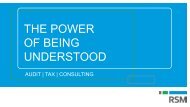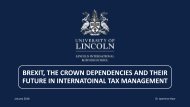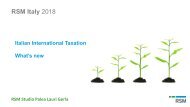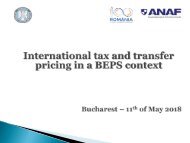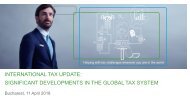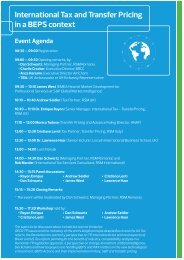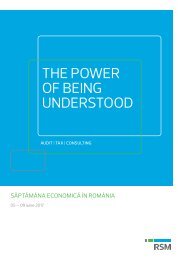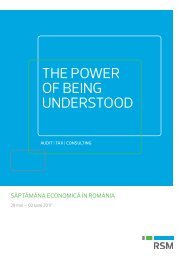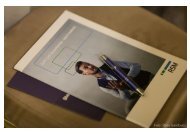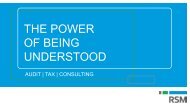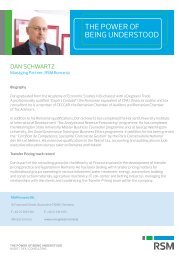RSM Romania_Business Brief_ 11-15.04.2016
Create successful ePaper yourself
Turn your PDF publications into a flip-book with our unique Google optimized e-Paper software.
THE POWER<br />
OF BEING<br />
UNDERSTOOD<br />
AUDIT | TAX | CONSULTING<br />
THE BUSINESS WEEK IN ROMANIA<br />
<strong>11</strong>-15 April 2016
MACRO<br />
New public acquisitions laws<br />
The new package of public acquisitions and<br />
concessions law will be put to a vote in the Chamber of<br />
Deputies on Wednesday, 20 April, two days after the<br />
expiry of the deadline for the application of the<br />
regulations, as stipulated by European Directives.<br />
The two commissions had a deadline of 18 February<br />
2016 to adopt the (admission) reports for the laws put<br />
forward by the government for the transparency of<br />
European acquisitions directives in the national<br />
legislation. The 2014 Directives stipulate among other<br />
things the abandonment of the “dictatorship” of the<br />
lowest price in public acquisition, placing the emphasis<br />
on the quality/price ratio. If they are adopted on 20<br />
April, the laws will be sent to President Iohannis for<br />
promulgation. If promulgated, they will enter into force<br />
after publication in the Official Gazette. But the laws<br />
will not be operational until after the Government<br />
adopts the norms for their application, a project which<br />
has already been drawn up by the National Public<br />
Acquisitions Authority (ANAP).<br />
Insurance premiere<br />
In 2016 <strong>Romania</strong>ns will have taken out a far greater<br />
number of obligatory than facultative home insurance<br />
policies. The bankruptcy of Astra and legislative<br />
changes of last year will lead to a premiere on the<br />
<strong>Romania</strong>n insurance market this year. The number of<br />
obligatory home insurance policies burgeoned by 6.6%<br />
last year, swelling to more than 1.59 million policies, and<br />
it is expected to reach the figure of 1.9 million this year,<br />
outstripping the number of facultative home policies,<br />
which last year dwindled by 2.45%, shrinking to 1.7<br />
million, a figure that is expected to remain stagnant this<br />
year, according to Aurel Badea, an UNSAR expert.<br />
Commissioning payment, costs passed on<br />
to taxpayers<br />
The vice-governor of the National Bank, Bogdan<br />
Olteanu, expects few commissioning payments to be<br />
made after application of the law adopted today in<br />
Parliament, although this does not rule out a severe<br />
risk to financial stability, through erosion of trust in the<br />
institution of the contract, he said in the first edition of<br />
Profit Live, a platform via which the most important<br />
issues on the public agenda will be debated. “We<br />
envisage a grave imperilment of financial stability due<br />
to the influence on the level of trust in society. Today,<br />
society sees that it is possible to alter a mortgage<br />
contract, tomorrow utilities contracts might be altered,<br />
and the day after that, loans contracts. The financial<br />
markets’ stance towards <strong>Romania</strong> might shift. It is a<br />
thing that we did not and do not wish, but we cannot<br />
rule it out,” said Olteanu. He also believes that we can<br />
expect few commissioning payments, since the<br />
majority of citizens who have taken out mortgages on<br />
the abodes wherein they dwell will wish to continue to<br />
reside therein: “We are a nation of property owners, a<br />
nation that worships property, and our homes are very<br />
much our principal wealth. The home is the chief<br />
element of household wealth.”<br />
New fuel tax<br />
All vehicle owners and users of fossil fuels will have to<br />
dig deeper in their pockets to pay for petrol and diesel<br />
after the introduction of a pollution tax of 5 <strong>Romania</strong>n<br />
bani per litre of fuel. Vehicle buyers will benefit from the<br />
planned cancellation of the environment stamp,<br />
however. The law proposing this measure was<br />
launched recently and is due to be voted on in Parliament.<br />
In the event that it is passed, it will abolish the<br />
current environment stamp. The initiators of the<br />
proposed law intend that the pollution tax should be<br />
raised from a 0.05 lei levy on the price of every litre of<br />
fuel. The authors of the law have calculated that an<br />
environment tax of 5 <strong>Romania</strong>n bani/litre of fuel will<br />
amount to around 2 <strong>Romania</strong>n lei for a full tank, and<br />
given that the average vehicle consumes a full tank<br />
every month, the tax will amount to 24 <strong>Romania</strong>n lei<br />
per annum and 360 <strong>Romania</strong>n lei for the average<br />
fifteen-year lifespan of a car. “There is not question of<br />
the tax leading to price hikes in the national economy,<br />
given that supra-excises of more than 40 <strong>Romania</strong>n<br />
bani/litre have not done so,” argue the law’s authors.<br />
At present, with the exception of electric or hybrid<br />
cars, the owners of new vehicles pay an environment<br />
stamp on purchase of the most popular makes, which<br />
varies according to cylindrical capacity and emissions,<br />
ranging from 60 to 300 euros.<br />
THE POWER OF BEING UNDERSTOOD<br />
AUDIT | TAX | CONSULTING
MACRO<br />
The National Anti-Corruption Strategy for 2016-2020,<br />
to be drawn up by mid-May<br />
The National Anti-Corruption Strategy for 2016-2020<br />
will be drawn up by mid-May and will be based on the<br />
conclusions of the SNA evaluation for the last four<br />
years, carried out by international experts, who<br />
analysed the impact of the document and are to<br />
establish the gaps and shortcomings they found<br />
therein, identifying the best practices. According to the<br />
Ministry of Justice, between 13 and 15 April the first<br />
independent evaluation of implementation of the<br />
2012-2015 National Anti-Corruption Strategy (SNA)<br />
was carried out. The conclusions of the evaluation of<br />
the SNA will form the basis of the strategic document<br />
for 2016-2020. This is to be put to public debate in<br />
mid-May and will subsequently be voted on by the<br />
Government, announced the Ministry of Justice. The<br />
external evaluation was carried out in order to assist<br />
the Ministry of Justice in analysing the impact of the<br />
2012-2015 SNA, to identify best practices, gaps and<br />
shortcomings in the four years of implementation. The<br />
experts will examine the 2012-2015 SNA objectives,<br />
their impact, efficiency and the efficacy of implementation<br />
measures and the sustainability of results.<br />
Sources: Hotnews, Profit.ro, News.ro<br />
BUSINESS<br />
The Chinese are coming to Rovinari<br />
The joint company created by the Oltenia Energy<br />
Complex in partnership with the China Huadian<br />
Engineering state company, which intends to build a<br />
600 MW heating plant in Rovinari, will be registered at<br />
the Registry of Commerce in May, according to a press<br />
statement issued by the complex. The investment will<br />
be almost one billion euros.<br />
OTP Bank lends to the Post Office<br />
OTP Bank <strong>Romania</strong> will grant the <strong>Romania</strong>n Post Office<br />
two credit lines, each worth ten million lei, payable<br />
within a year, in order to finance on-going activities.<br />
The bank, owned by the Hungarian OTP group, won a<br />
tender held by the national post office operator in<br />
October last year, at which the <strong>Romania</strong>n Commercial<br />
Bank and Bancpost also made offers. The Post Office<br />
asked for offers for a credit line worth a total of twenty<br />
million lei, divided into two equal parts. The operator<br />
estimated that it will pay interest and commission to<br />
the sum of 1.1 million lei, but the final contract stipulates<br />
costs of 750,000 lei. The terms of the contract were<br />
reached through negotiation to reach the lowest price.<br />
The Post Office will repay the loan from its own funds.<br />
Discovery confirmed in the Black Sea<br />
In October 2015, Lukoil, PanAtlantic and Romgaz<br />
announced the discovery of an important seam of<br />
natural gas on <strong>Romania</strong>’s continental shelf. According<br />
to evaluations carried out by Russian experts from<br />
Lukoil, the LIRA seam within the Trident perimeter of<br />
the Black Sea contains reserves of more than<br />
thirty-two billion cubic metres. Visiting <strong>Romania</strong>,<br />
Vladimir I. Nekrasov, the first vice-president of Lukoil,<br />
met with Minister of Energy Victor Grigorescu on 13<br />
April. Talks tackled Lukoil production and current<br />
activity, the investments needed to achieve energy<br />
and environmental efficiency, and the prospects for<br />
future development of the Lukoil refinery in Ploiești.<br />
Oresa and Cristian Amza take over La Fântâna<br />
On Thursday, 14 April, Swedish investment fund Oresa<br />
signed an agreement with Cristian Amza, founder of<br />
La Fântâna, an agreement to buy all the shares owned<br />
by Polish investment fund Innova Capital. In 2007<br />
La Fântâna was bought from Oresa by Innova Capital<br />
as part of a transaction worth more than thirty-five<br />
million euros, with the Swedish fund making an<br />
estimated six hundred per cent profit on its initial<br />
investment, with Innova Capital owning 92% and<br />
founder Cristian Amza the remaining 8%. In 2014 the<br />
company bought Blue Coffee Services from Aquila<br />
Group, and subsequently La Fântâna merged with the<br />
coffee machine company, the local Lavazza distributor,<br />
with the group run by Cristian Amza in effect setting<br />
the pace for water distributions services in <strong>Romania</strong><br />
and Serbia. At present it provides integrated national<br />
services in both markets, covering the entire chain,<br />
from water sourcing to production/bottling plants<br />
and water and coffee distribution through its own<br />
logistics network.<br />
THE POWER OF BEING UNDERSTOOD<br />
AUDIT | TAX | CONSULTING
BUSINESS<br />
E-commerce at a new level<br />
The marketplace platform utilised by eMAG helps<br />
retailers to reach customers more quickly and more<br />
easily, and has become the largest local online retailer.<br />
With the help of the platform, the company provides a<br />
simple but effective channel, which offers very good<br />
visibility to a wide range of products and retailers, from<br />
electrical goods, telephones, toys, furniture, cosmetics<br />
and sports equipment to products for the home and<br />
garden. It is also a very good way of making money<br />
from other people’s goods, which eMAG has been<br />
practising very effectively since 20<strong>11</strong>, becoming an<br />
online “mall” that will bring the company almost 40% of<br />
total online orders by 2017, almost twice as much as in<br />
2015. At the eMAG Marketplace New Sellers conference<br />
held in partnership with Ziarul Financiar, Iulian<br />
Stanciu, eMAG’s CEO, declared: “This year the marketplace<br />
platform will generate 27% of orders and 22% of<br />
their value, or more than one hundred million euros. We<br />
expect this to double in future.” Last year eMAG<br />
recorded business worth 353 million euros (direct sales<br />
plus those made via marketplace partners) and<br />
estimates that it will reach the threshold o half a billion<br />
euros this year. eMAG is trying hard to develop the<br />
e-commerce market in <strong>Romania</strong>, in terms of both<br />
volume and high standards of service, with the<br />
marketplace platform being the company’s main<br />
direction for growth. At present more than 750,000<br />
products from 1,250 sellers are listed.<br />
The resource productivity in <strong>Romania</strong> and Europe<br />
In 2014 <strong>Romania</strong> came second from last after Bulgaria<br />
in the list of EU member states by resource<br />
productivity. It seems that developments over the last<br />
few years in the productivity of European resources<br />
have not been of much help to <strong>Romania</strong>. Making<br />
equivalent of just 0.7 euro per kilogramme of raw<br />
material utilised in 2014, <strong>Romania</strong> achieves only a third<br />
of the EU average and is a long way behind countries<br />
such as Holland (3.5 euros/kg), the U.K (3.4 euros/kg),<br />
Italy (3.2 euros/kg) and Spain (3 euros/kg).<br />
The productivity of a country’s resources is measured<br />
by dividing its GDP by domestic materials consumption<br />
(materials from domestic production plus the balance<br />
between imported and exported raw materials). In<br />
order to ensure comparability between different<br />
countries, the GDP per capita is employed at parity<br />
with standard purchasing power and in order to trace<br />
correctly the evolution in time GDP per capita in real<br />
terms is employed, adjust according to volume at the<br />
prices of a reference year.<br />
According to Eurostat data, resource productivity is<br />
mainly influenced by the drop in the quantity of raw<br />
materials utilised by an economy. The situation in which<br />
development has not kept up with the consumption of<br />
materials and raw materials utilised to secure development<br />
is completely atypical at the European level and in<br />
the regional context, where Poland, Hungary and even<br />
Bulgaria have managed to perform much better.<br />
Sources: Profit.ro, News.ro, Evz.ro, economica.net,<br />
mirsanu.ro, revistabiz.ro, ZF.ro, capital.ro,<br />
cursdeguvernare.ro<br />
THE POWER OF BEING UNDERSTOOD<br />
AUDIT | TAX | CONSULTING




